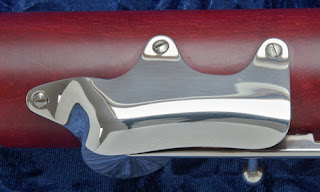A good rule of thumb when choosing a bassoon crook is to follow your ear and choose one that helps you to play in tune and to produce a sound that you are happy with.
Here are some crook characteristics which an awareness of will help
you choose a crook you like:
1.
It is
best to buy a crook that is in good shape. A dent or bend in the crook due to
damage can change the shape of the bore and affect the air flow through the
instrument. This can have a strangling effect on your sound and may affect your
tuning. It is worth getting a good quality crook repaired, especially an old
Heckel, but it is often preferable to replace a crook if it gets damaged
2.
Different
makers produce crooks that have different types of sound. It is sometimes said
that Puchner crooks produce a dark sound, for example, and Heckel crooks are
said to be some of the best all round crooks. Heckel crooks made pre-1945 are
well known for making a beautiful sound and are consequently highly sought after.
Crooks by other makers are also good – Puchner, Fox, Adler, Schreiber, Monnig,
Yamaha, Leitzinger and so on
3.
The
type of metal the crook is made from affects the overall sound, so you may wish
to try different types. Crooks are usually made from a copper alloy, often
referred to as German silver, which is made up of a mixture of copper, nickel
and zinc. Crooks can also be made in brass, gold, sterling silver, palladium
and even wood
4.
The
length of the crook – most crooks use a number one, two or three. These numbers
refer to the length of the crook, 1 being short and thus raising the pitch
slightly, 3 being longer and lowering the pitch slightly. If you bassoon plays
flat or sharp a shorter or longer crook may help
| Heckel bassoon crook for sale at Double Reed Ltd. |







